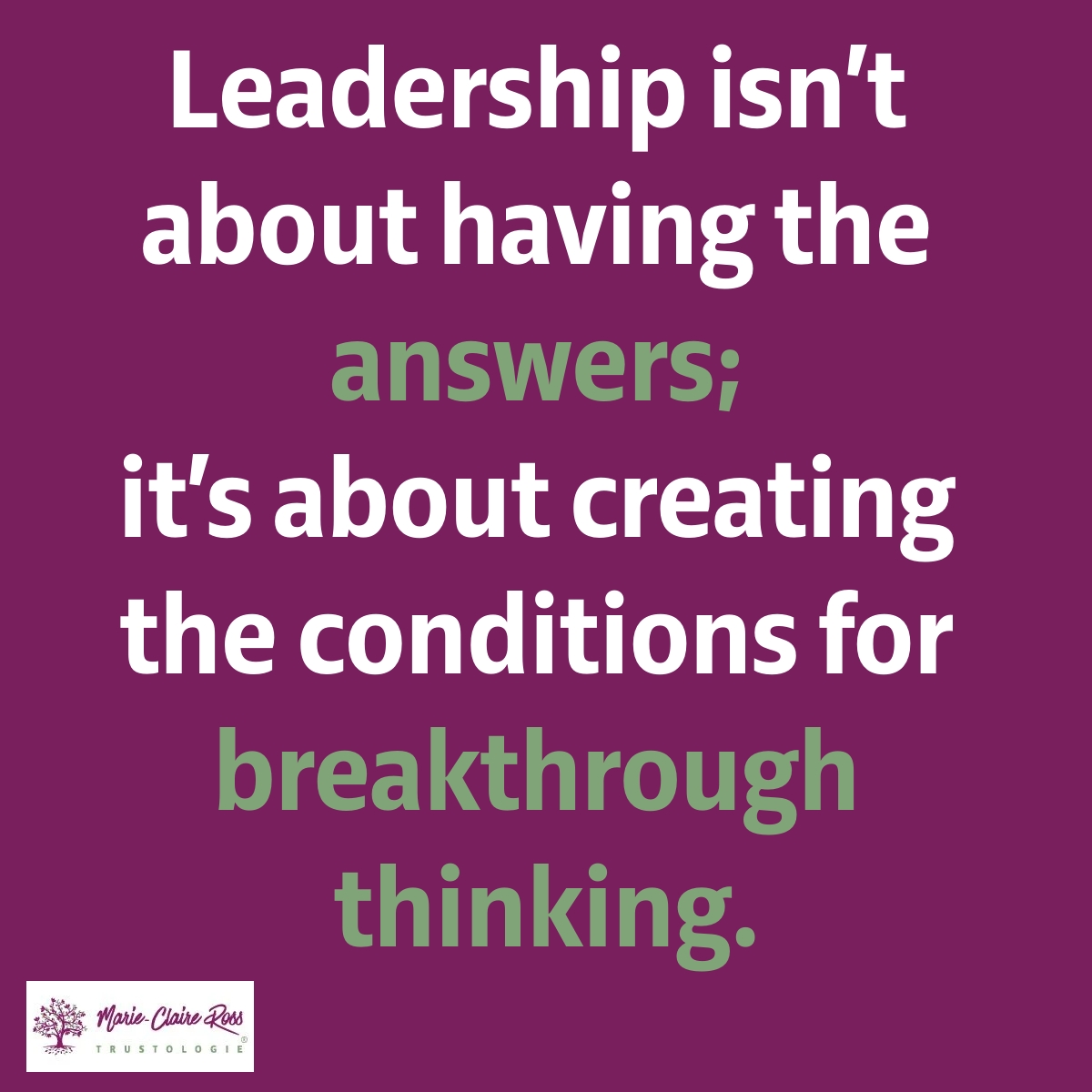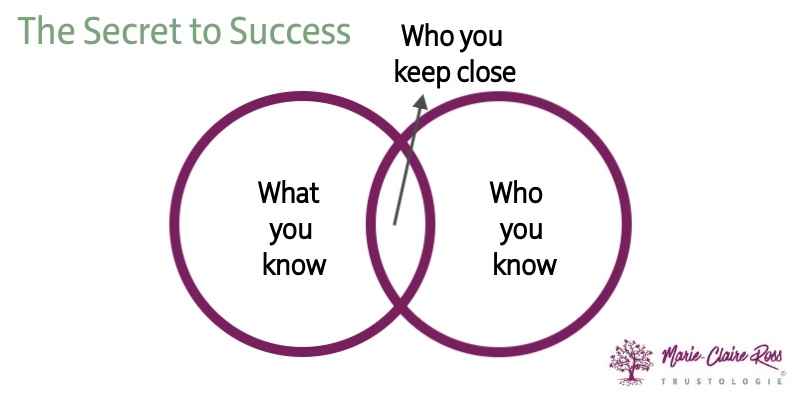8 min read
Beyond the "Why": 5 Coaching Secrets to Unlock Curiosity in Leadership
When my daughter was 17 months old, she discovered a superpower: the word “Why?”For the next two years, it was her response to almost everything.
Develop leaders, strengthen executive teams and gain deep insights with assessments designed to accelerate trust and performance.

Transform how your leaders think and perform with keynotes that spark connection, trust and high-performance cultures.

Explore practical tools, thought-leadership and resources to help you build trusted, high-performing teams.

Trustologie® is a leadership development consultancy founded by Marie-Claire Ross, specialising in helping executives and managers build high-trust, high-performing teams.

5 min read
Marie-Claire Ross : Updated on December 4, 2022

We all know the world of work is undergoing profound changes. What makes change difficult is that organisations, and leaders, are still applying a framework designed for another time and place.
A time when there was rote, repetitive work and people were treated as human resources – not human beings. A time when companies mattered, not people.
Hybrid working requires overhauling the relationship between employers and workers. It's really about humanising the workplace which starts with putting your people at the centre of everything you do. This involves handing power to employees – to choose how they work, when they work, what they work on and why.
Most employees are struggling with email overwhelm with multiple departments vying for their attention. Time-poor employees want less general email preferring specific communication relevant to their job role.
A common misperception with corporate communication is that awareness building is equal to communication. Yet, sharing information doesn’t always produce awareness.
Today, employees want corporate communication that consolidates the right information, in the right sequence, when they need it.
Employees want more than just the one-way style of communication email blast. Instead, they want more opportunities for dialogue, rather than the standard monologue.
To engage the hearts and minds of employees requires developing powerful emotional content. Communication that leverages a variety of communication methods and is personalised and contextualised for different employee groups.
2. Flexible work
Working 9 to 5 might be a catchy song, but it is still no way to make a living these days.
According to a recent Future Forum survey, ninety-four (94%) of employees want flexibility in when they work, while 84% of employees want flexibility in where they work.
Flexible working is more than having the freedom to work from home a couple of days a week. It's also the opportunity to work where you want - whether that be while you take a short trip to a tropical island or if you have to move back to your mother land because of a sick relative.
It's time for leaders to detach themselves from the belief that people must be working from 9 to 5. The truth is people love the flexibility to work the hours around their lifestyles.
3. Meaningful work
People love their job if it matters whether they show up to work. Most of us have had the experience of turning up to work, not because we wanted to, but because we knew we were needed. Our presence and effort made a real difference to those around us.
As I unpack in my book, Trusted to Thrive: How leaders create connected and accountable teams, there are four types of meaningful work that revolve around understanding the different types of beneficiaries of the work we do. These being - understanding how work helps internal customers, external customers, yourself and your boss. It's about understanding both the intrinsic and extrinsic impact of work.
This requires leaders who know how to link each of their direct reports with how their work matters to everyone around them.
According to The Energy Project, employees who derive meaning from their work are:
- 3 times more likely to stay at their organisation.
- 1.7 times more satisfied in their job, and
- 1.4 times more engaged at work.
4. Creating Connection
Connection has always been important to employees but has charged remarkably in hybrid working.
One of the downsides of remote work is minimal contact with other humans. Employees who feel disconnected from their colleagues are more likely to feel undervalued, disrespected and leave their organisation. Dehumanisation is a common side effect to hybrid work.
It means updating the old perception that culture lives in the office. It actually lives in our interactions and communication. Culture has transitioned from physical proximity to emotional proximity.
Today, leaders must work harder so their employees feel connected to them and one another. It requires being more conscious about making every interaction count, so that people feel seen, valued and heard.
This requires making team meetings more meaningful and one-on-one's. It also means understanding that every email, text or phone conversation is contributing to the culture of your team.
Now, leaders must ensure they do emotional check-ins with their employees and really take the time to understand each of their employees for who they really are. It means encouraging people to talk about their personal lives and interests. If you want more tips on how to do this, my book Trusted to Thrive, unpacks an easy system to help.
5. Making In-person Events Matter
People will come into the office if there is perceived value.
People thrive in their jobs when they have autonomy and the power to control their work environment. It also sends the message that leaders trust employees to do the right thing, which is one of the most important building blocks of trust. Without autonomy, employees feel devalued and suffer poor mental health.
Ask employees how they want to do things and give them the freedom to plan and do work their way.
7. Leading through Consultation
Employees will always reject any new process, system, training or change that feels as if it's being done to them, not for them.
As mentioned in the first item, employees want to be consulted. They don't want one-way communication that tells them what to do.
Employees want more opportunities for dialogue, rather than the standard monologue. Leaders who seek the opinions of their employees and collect employee feedback ensure that people's needs are being addressed.
8. Encouraging employees to be more inclusive
If we are going to celebrate our humanness and banish the old saying "leave your personal issues at the door," then we also need to provide a safe space for people to be themselves.
I am not talking about the negative, ego-fuelled self that can create a lot of havoc in the workplace, but the authentic self. This means that employees and leaders need to accept people no matter their religion, gender identity, race or political standing.
The Future of Work is about Humanity at Work

8 min read
When my daughter was 17 months old, she discovered a superpower: the word “Why?”For the next two years, it was her response to almost everything.

11 min read
I have a friend who often finds herself at the mercy of her emotions. Recently, she called me to rehash a confrontation she’d had with a group of...

9 min read
True leadership presence isn’t a performance or a set of charisma hacks; it is the felt experience of who you are being in the room. By cultivating...

Cast your mind back to when you last had a face-to-face meeting in your leadership or management team. What did you talk about? Typically, most...

The pandemic has been a game-changer in so many aspects. In the workplace, it has really crystallised what we want in our work experience.

A few years ago, I was sitting in a large auditorium listening to the wonderful, Jim Collins, who studied what makes great companies tick for...